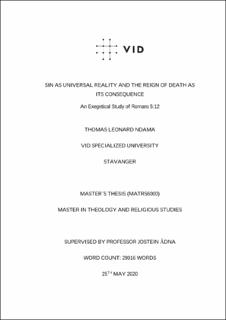| dc.description.abstract | This study deals with an exegesis of Rom 5:12 as a biblical text presenting a concept of sin as universal reality and the reign of death as its consequence. Its research question is, “how is the connection between Adam’s sin and the universal fact that ‘all sinned’ according to Romans 5:12, and what is the character of this universal sin?” With this question, the study scrutinizes the relationship between a sound exegesis of Rom 5:12 and the concept of universal hereditary sin through procreation – retained in Lutheran tradition. In so doing, exegetical and hermeneutical methods have been applied to Rom 5:12 with consideration to the three modes “behind, in, and in front of the text.” Recognizably, the apostle Paul was well acquainted with the Old Testament, particularly, Gen 2-3 and early Jewish writings in his expression about sin. Nevertheless, he goes further than the existing traditions that interpreted Gen 2-3 and upheld the Deuteronomistic tradition by defining sin primarily as transgression of commandment(s). For Paul, sin is a supra-individual power that reigns through death by which all humanity – understood as “flesh” – is inescapably exposed to sin. Moreover, the apostle’s concern in Rom 5:12 is about the universality of death as a consequence of one man’s (Adam’s) sin, but nothing is told concerning hereditary sin through procreation. Adam’s sin becomes either a model due to the free will alive in everyone, or an involuntary choice, but bearing no inherited guilt to the rest of humanity. It is just through Adam in whom sin found the first entry into the world and, consequently, death came through and triumphs over all humanity. However, as far as sin and death are considered by the apostle to be evil powers, human beings are incapable of overcoming them by themselves. It is only through faith in Jesus Christ by whom victory can be gained: baptism as the first part of regeneration as dying to sin with Christ and being renewed in His resurrection. | en_US |
